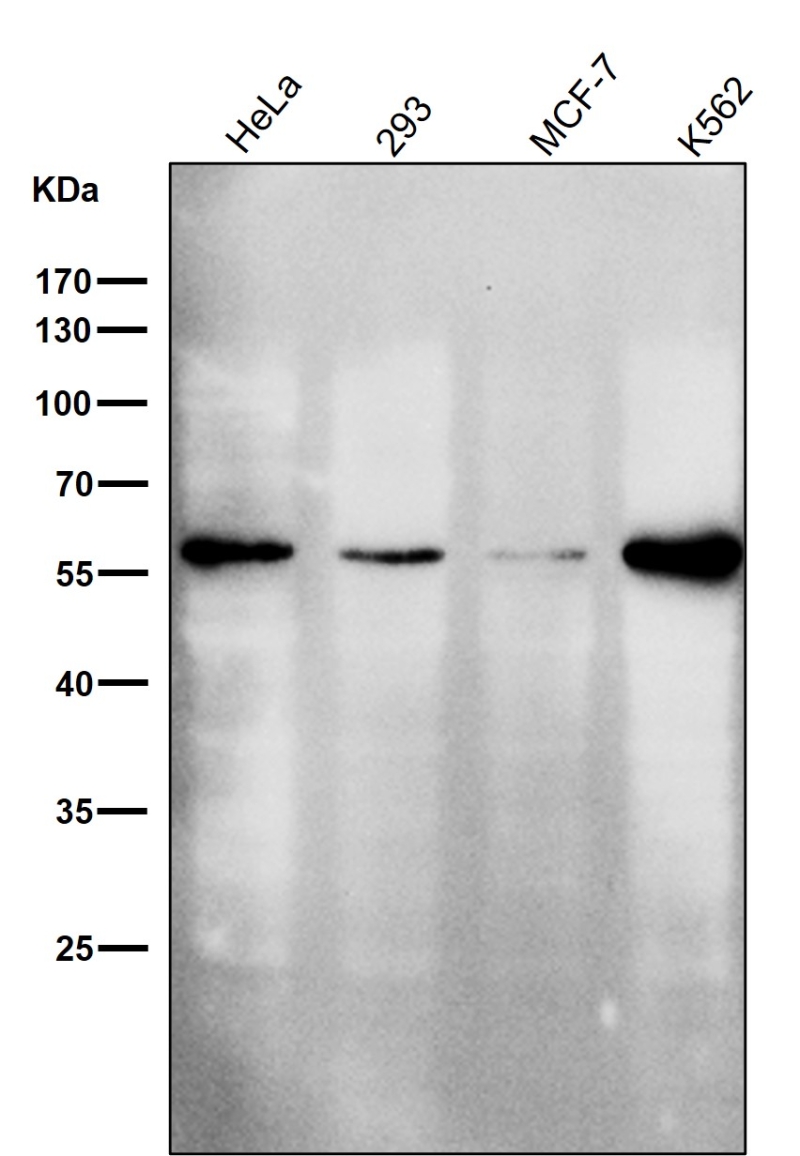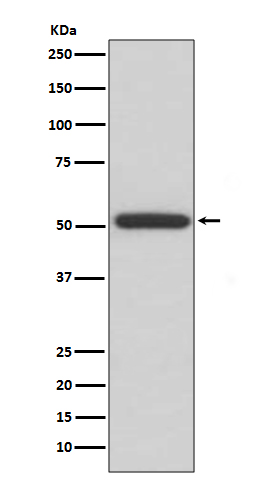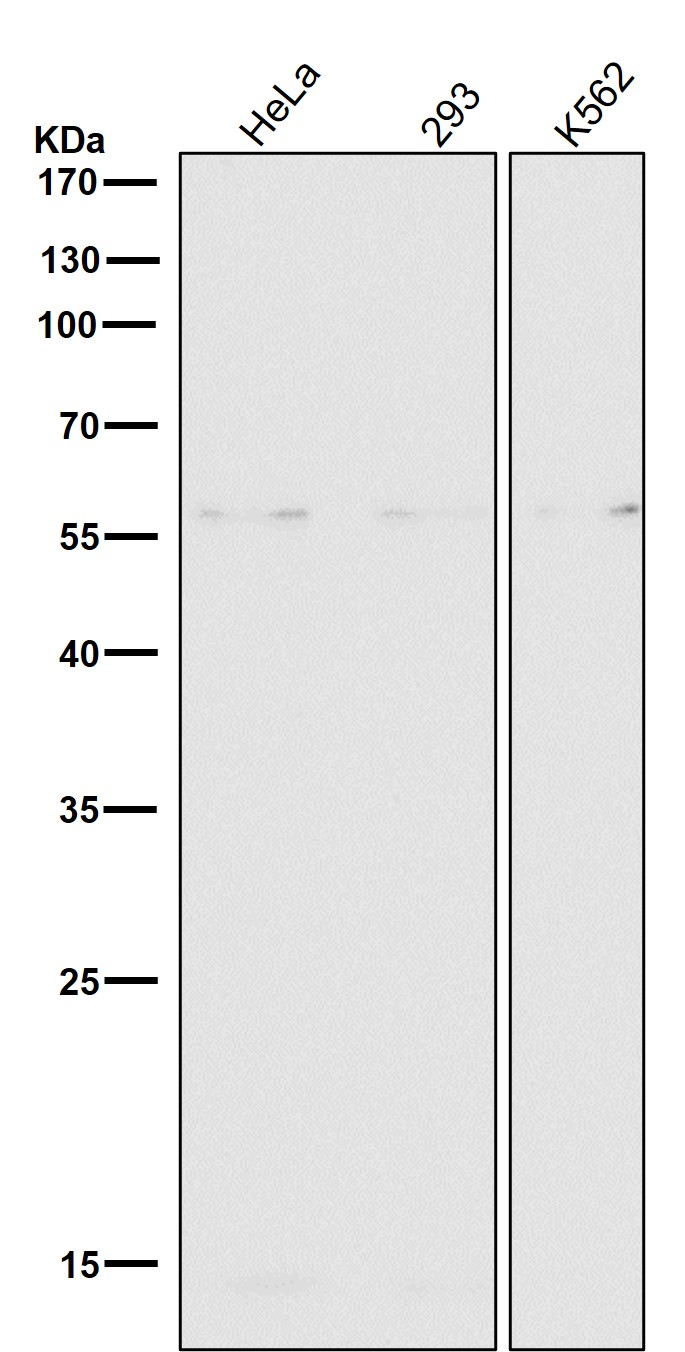


| WB | 咨询技术 | Human,Mouse,Rat |
| IF | 1/20-1/50 | Human,Mouse,Rat |
| IHC | 1/100-1/200 | Human,Mouse,Rat |
| ICC | 技术咨询 | Human,Mouse,Rat |
| FCM | 咨询技术 | Human,Mouse,Rat |
| Elisa | 咨询技术 | Human,Mouse,Rat |
| Aliases | ERp57; ERp60; ERp61; Glucose Regulated Protein 58 Kd; HsT17083; p58; PDIA3; Phospholipase C alpha; PI PLC;;ERp57 |
| WB Predicted band size | 57 kDa |
| Host/Isotype | Rabbit IgG |
| Antibody Type | Primary antibody |
| Storage | Store at 4°C short term. Aliquot and store at -20°C long term. Avoid freeze/thaw cycles. |
| Species Reactivity | Human |
| Immunogen | A synthesized peptide derived from human ERp57 |
| Formulation | Purified antibody in PBS with 0.05% sodium azide,0.05% BSA and 50% glycerol. |
+ +
以下是关于ERp57抗体的3篇参考文献示例(文献信息为示例性质,请通过学术数据库核实):
---
1. **文献名称**: "ERp57: A multifunctional protein in the endoplasmic reticulum"
**作者**: Ellgaard L, Frickel EM
**摘要**: 综述ERp57作为硫氧还蛋白家族成员在内质网中的作用,包括参与MHC I类分子组装、蛋白质二硫键异构化及与钙网蛋白/钙联蛋白复合物的相互作用机制。
---
2. **文献名称**: "ERp57 expression in cancer cells and its role in chemoresistance"
**作者**: Coe H, Jung J, Lee S
**摘要**: 研究ERp57在多种癌细胞系中的高表达现象,揭示其通过调控未折叠蛋白反应(UPR)促进肿瘤细胞存活及化疗耐药性的分子通路。
---
3. **文献名称**: "ERp57 interacts with SARS-CoV-2 spike protein and modulates viral entry"
**作者**: Zhang Y, et al.
**摘要**: 探讨ERp57与新冠病毒刺突蛋白的相互作用,发现其通过影响病毒受体结合域(RBD)的构象变化,可能参与调控病毒入侵宿主细胞的效率。
---
如需具体文献,建议通过PubMed或Google Scholar以关键词“ERp57 antibody”、“PDIA3 function”或“GRP58”检索最新研究。
ERp57 (Endoplasmic Reticulum Protein 57), also known as PDIA3 or GRP58. is a member of the protein disulfide isomerase (PDI) family. It localizes primarily within the endoplasmic reticulum (ER) and plays a critical role in protein quality control by catalyzing disulfide bond formation, isomerization, and assisting in the folding of nascent glycoproteins. ERp57 interacts with lectin chaperones calnexin and calreticulin, forming a complex that ensures proper folding of MHC class I molecules and other glycoproteins. Beyond its canonical role, ERp57 has been implicated in diverse cellular processes, including calcium homeostasis, cell adhesion, and immune response regulation.
Dysregulation of ERp57 is linked to various diseases. Overexpression is observed in cancers, correlating with tumor progression, drug resistance, and poor prognosis. Conversely, reduced ERp57 activity is associated with neurodegenerative disorders like Alzheimer’s disease, possibly due to impaired protein folding. ERp57 also participates in viral infection mechanisms, aiding in the processing of viral glycoproteins.
ERp57 antibodies are essential tools for studying its expression, localization, and function. They are widely used in techniques such as Western blotting, immunohistochemistry, and immunofluorescence to investigate ERp57’s role in physiological and pathological contexts. Specific antibodies help identify its interaction partners and post-translational modifications, contributing to therapeutic research targeting ERp57-related pathways. However, antibody specificity must be validated due to structural similarities among PDI family members.
×